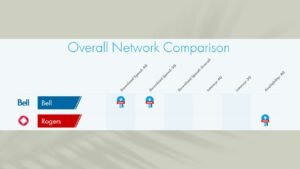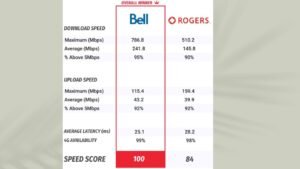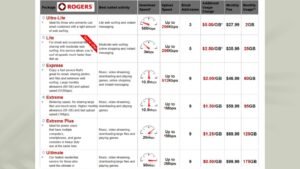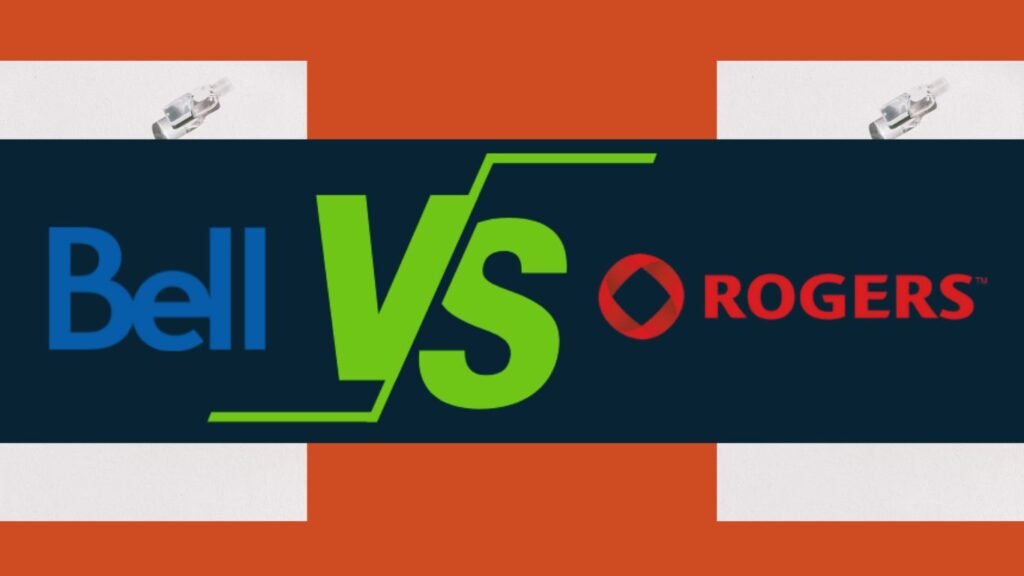Introduction:
When it comes to choosing an internet provider, one of the most important factors to consider is internet speed. Bell and Rogers are two of the largest internet providers in Canada, and they both offer a range of internet plans with varying speeds. In this article, we’ll compare the internet speeds of Bell and Rogers to help you make an informed decision about which provider to choose.

Headings:
- Bell vs Rogers Internet Speeds: An Overview
- Bell Internet Speeds
- Rogers Internet Speeds
- Factors That Affect Internet Speeds
- How to Test Your Internet Speed
- Which Provider Offers Better Internet Speeds?
- FAQs About Bell vs Rogers Internet Speeds
- Conclusion
Sub Headings:
Bell vs Rogers Internet Speeds: An Overview
- Introduction to Bell and Rogers
- Comparison of internet plans
- How internet speeds affect your online experience
Bell Internet Speeds
- Types of Bell internet plans
- Speeds offered by Bell
- Advantages and disadvantages of Bell internet speeds
Rogers Internet Speeds
- Types of Rogers internet plans
- Speeds offered by Rogers
- Advantages and disadvantages of Rogers internet speeds
Factors That Affect Internet Speeds
- Location
- Network congestion
- Hardware and software
- Plan type and pricing
How to Test Your Internet Speed
- Online speed test tools
- Tips for accurate speed tests
- Troubleshooting internet speed issues
Which Provider Offers Better Internet Speeds?
- Comparison of Bell and Rogers speeds
- Factors to consider when choosing a provider
- User reviews and ratings
FAQs About Bell vs Rogers Internet Speeds
- What is the average internet speed in Canada?
- Are there any data caps on Bell and Rogers internet plans?
- How can I improve my internet speed?
- Can I switch between Bell and Rogers internet plans?
Table of Contents
ToggleBell vs Rogers Internet Speeds: An Overview

Internet speed is a crucial factor to consider when selecting an internet provider. It impacts the quality of your online experience, from streaming movies to playing games to video conferencing with colleagues. Bell and Rogers are two of the biggest internet providers in Canada, and they offer a variety of internet plans with varying speeds.
Comparison of Internet Plans
Bell and Rogers offer internet plans in different tiers based on their speed and pricing. Bell’s Fibe Internet plans start at 50 Mbps and go up to 1.5 Gbps, while Rogers’ Ignite plans range from 75 Mbps to 1 Gbps. Both providers also offer unlimited data usage on their plans.
How Internet Speeds Affect Your Online Experience
The speed of your internet connection can affect how quickly you can download files, stream videos, and browse the web. The faster your internet speed, the smoother and more seamless your online experience will be. If you’re a heavy internet user or have multiple devices connected to the internet, it’s important to choose a plan with faster speeds to avoid buffering, lag, or slow loading times.
Bell Internet Speeds
Bell offers a range of internet plans under the Fibe Internet brand. These plans use fiber-optic technology to deliver faster internet speeds compared to traditional DSL or cable connections.
Types of Bell Internet Plans
Bell offers several internet plans, including:
- Fibe 50: offers download speeds of up to 50 Mbps and upload speeds of up to 10 Mbps
- Fibe 150: offers download speeds of up to 150 Mbps and upload speeds of up to 50 Mbps
- Fibe 300: offers download speeds of up to 300 Mbps and upload speeds of up to 100 Mbps
- Fibe 1.5 Gbps: offers download speeds of up to 1.5 Gbps and upload speeds of up to 940 Mbps
Speeds Offered by Bell
Bell’s internet speeds are fast and reliable, thanks to its fiber-optic technology. With its Fibe 1.5 Gbps plan, users can enjoy lightning-fast download speeds of up to 1.5 Gbps, which is over 20 times faster than Bell’s Fibe 50 plan. Bell’s upload speeds are also impressive, with its Fibe 1.5 Gbps plan offering upload speeds of up to 940 Mbps.
Advantages and Disadvantages of Bell Internet Speeds
Some advantages of Bell internet speeds include:
- Fast and reliable speeds: Bell’s fiber-optic technology delivers fast and reliable internet speeds, even during peak usage hours.
- Multiple internet plans: Bell offers a range of internet plans with varying speeds and pricing to suit different needs and budgets.
- Unlimited data usage: All of Bell’s internet plans come with unlimited data usage, so users don’t have to worry about overage charges.
Some disadvantages of Bell internet speeds include:
- Limited availability: Bell’s fiber-optic technology is not available in all areas, so users in some regions may not be able to access its faster internet plans.
- Higher pricing: Bell’s faster internet plans can be more expensive compared to its slower plans or plans offered by other providers.
Rogers Internet Speeds
Rogers offers a variety of internet plans under the Ignite brand. Its plans use a combination of cable and fiber-optic technology to deliver fast and reliable speeds.

Types of Rogers Internet Plans
Rogers offers several internet plans, including:
- Ignite 75: offers download speeds of up to 75 Mbps and upload speeds of up to 10 Mbps
- Ignite 150: offers download speeds of up to 150 Mbps and upload speeds of up 15 Mbps
- Ignite 500: offers download speeds of up to 500 Mbps and upload speeds of up to 20 Mbps
- Ignite 1Gbps: offers download speeds of up to 1 Gbps and upload speeds of up to 30 Mbps
Speeds Offered by Rogers
Rogers’ internet speeds are also fast and reliable, thanks to its use of cable and fiber-optic technology. Its Ignite 1 Gbps plan offers download speeds of up to 1 Gbps, which is the same as Bell’s Fibe 1.5 Gbps plan. However, Rogers’ upload speeds are lower compared to Bell’s, with its Ignite 1 Gbps plan offering upload speeds of up to 30 Mbps.
Advantages and Disadvantages of Rogers Internet Speeds
Some advantages of Rogers internet speeds include:
- Fast and reliable speeds: Rogers’ combination of cable and fiber-optic technology delivers fast and reliable internet speeds.
- Multiple internet plans: Rogers offers a range of internet plans with varying speeds and pricing to suit different needs and budgets.
- Availability: Rogers’ internet plans are available in more regions compared to Bell’s fiber-optic technology.
Some disadvantages of Rogers internet speeds include:
- Limited upload speeds: Rogers’ upload speeds are lower compared to Bell’s, which may be a disadvantage for heavy internet users who need to upload large files.
- Limited availability of higher speeds: Rogers’ faster internet plans may not be available in all areas, similar to Bell’s fiber-optic technology.
Bell vs Rogers Internet Speeds: Which One Should You Choose?
Choosing between Bell and Rogers internet speeds can depend on several factors, including your location, budget, and internet usage habits.

If you prioritize faster upload speeds, Bell may be the better choice for you, as its fiber-optic technology offers higher upload speeds compared to Rogers. Additionally, if you live in an area where Bell’s fiber-optic technology is available, you may be able to access faster internet speeds compared to Rogers.
On the other hand, if you prioritize availability and affordability, Rogers may be the better choice, as its internet plans are available in more regions and may be more budget-friendly compared to Bell’s faster plans.
Ultimately, it’s important to compare the internet plans offered by both providers and choose the one that best suits your needs and budget. Consider factors such as internet speed, pricing, availability, and data usage when making your decision.
Frequently Asked Questions
Can I switch from Bell to Rogers or vice versa?
Yes, you can switch from one provider to another. However, you may need to check for any early cancellation fees or other charges before making the switch.
How do I check the availability of Bell’s fiber-optic technology in my area?
You can check the availability of Bell’s fiber-optic technology by entering your address on its website or contacting its customer service.
Are there any overage charges for Bell or Rogers internet plans?
No, both providers offer unlimited data usage on their internet plans, so there are no overage charges.
Conclusion
Bell and Rogers are two of the biggest internet providers in Canada, offering a range of internet plans with varying speeds and pricing. Bell uses fiber-optic technology to deliver faster internet speeds, while Rogers uses a combination of cable and fiber-optic technology. Choosing between the two providers can depend on several factors, including your location, budget, and internet usage habits. By considering factors such as internet speed, pricing, availability, and data usage, you can make an informed decision and choose the provider that best suits your needs.

